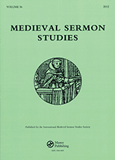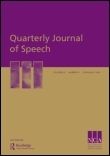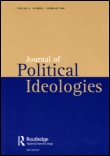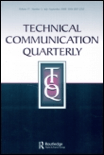
Res Rhetorica
Scope & Guideline
Connecting Scholars through the Lens of Rhetoric
Introduction
Aims and Scopes
- Rhetoric in Contemporary Contexts:
The journal emphasizes the application of rhetorical analysis in contemporary contexts, including politics, media, and social movements, reflecting the evolving nature of rhetoric in public discourse. - Interdisciplinary Approaches:
Res Rhetorica encourages interdisciplinary research that integrates rhetoric with other fields such as linguistics, communication studies, and cultural studies, enriching the analysis of rhetorical phenomena. - Historical and Cultural Perspectives:
The journal publishes articles that explore historical and cultural aspects of rhetoric, examining how rhetorical practices have evolved over time and their impact on society. - Digital Rhetoric:
There is a growing focus on digital rhetoric, analyzing how digital platforms influence communication strategies and the construction of identity in the online space. - Health and Environmental Rhetoric:
The journal addresses specific areas such as health-related rhetoric and environmental discourse, highlighting how rhetoric shapes public understanding and action in these critical domains.
Trending and Emerging
- Rhetoric of Identity and Social Justice:
Recent publications increasingly address issues of identity, including gender, race, and sexuality, highlighting the role of rhetoric in social justice movements. - Crisis Communication:
The journal has witnessed a surge in articles exploring rhetoric in times of crisis, such as public health emergencies and political upheaval, underscoring the relevance of rhetorical strategies in managing crises. - Environmental Rhetoric:
There is a growing emphasis on environmental rhetoric, with an increasing number of studies examining how rhetorical strategies influence public perception and action regarding environmental issues. - Digital and Social Media Rhetoric:
The impact of social media on rhetorical practices is a prominent theme, reflecting the need to understand how digital platforms shape communication and influence public discourse. - Rhetorical Analysis of Populism:
Emerging research focuses on the rhetoric of populism, analyzing how populist leaders and movements utilize rhetorical strategies to mobilize support and influence public opinion.
Declining or Waning
- Traditional Rhetorical Theories:
There is a noticeable decrease in publications focused solely on classical or traditional rhetorical theories, as the journal shifts towards more contemporary and applied rhetorical studies. - Rhetoric of Literature:
The analysis of rhetoric specifically within literary texts appears to be waning, with fewer articles dedicated to this niche compared to the journal's earlier issues. - Rhetorical Education:
Themes related to rhetoric education and pedagogy seem to be less prevalent, indicating a potential shift away from discussions on teaching rhetoric towards more applied and research-oriented topics.
Similar Journals

Communiquer
Empowering Voices, Enriching Perspectives.Communiquer is a distinguished open-access journal published by UNIVERSITÉ DU QUÉBEC À MONTRÉAL (UQAM), focusing on the vibrant fields of Communication and Linguistics. Since its inception in 2009, it has gained recognition for fostering scholarly dialogue and disseminating groundbreaking research. Hailing from Canada, the journal aims to provide a platform for researchers, practitioners, and students to explore the dynamic interplay between language and communication. With a current impact factor that places it in the Q4 category for Communication and Q3 for Linguistics and Language in 2023, Communiquer promotes innovative investigations and diverse perspectives, encouraging interdisciplinary collaboration. Despite its relatively emerging status—ringing in at percentile rankings of 28th and 11th in its respective fields—it continues to contribute significantly to the academic landscape. Scholars looking to publish and access pertinent research will find Communiquer an essential resource that supports the advancement of knowledge in these crucial disciplines.

Argumentation et Analyse du Discours
Exploring the Dynamics of Discourse and Argumentation.Argumentation et Analyse du Discours is a leading open-access journal dedicated to the exploration of discourse analysis and the intricate dynamics of argumentation within the French language context. Published by the TEL AVIV UNIVERSITY, FACULTY OF HUMANITIES, FRENCH DEPARTMENT ADARR RESEARCH GROUP, this journal serves as a vital resource for scholars and practitioners interested in the theoretical and practical dimensions of argumentation. Since its inception in 2008, the journal has committed to offering innovative research articles that illuminate the interplay between language, culture, and ideology. Researchers and students alike will find invaluable insights within its pages, as it fosters interdisciplinary dialogue and promotes rigorous analysis in the evolving field of discourse studies. With its accessible format and engagement with contemporary issues, Argumentation et Analyse du Discours is essential for anyone seeking to deepen their understanding of communication in a rapidly changing world.

Medieval Sermon Studies
Stimulating Critical Dialogues on Medieval InfluenceMedieval Sermon Studies is a distinguished academic journal dedicated to the exploration of medieval sermons and their impact on literature and religious discourse. Published by Routledge Journals, Taylor & Francis Ltd, this journal has become a vital resource for scholars within the fields of Literature and Literary Theory, as well as Religious Studies. With its ISSN 1366-0691 and E-ISSN 1749-6276, it spans a decade of exceptional scholarship from 2013 to 2023. Although currently categorized as Q3 in Literature and Literary Theory and Q4 in Religious Studies according to the 2023 quartiles, the journal plays a crucial role in stimulating critical dialogues and fostering interdisciplinary research. Accessing its insightful content, while not available through Open Access, provides unique opportunities for students, researchers, and professionals to engage with the nuances of medieval rhetoric and theology. As the discourse within this field continues to evolve, Medieval Sermon Studies stands at the forefront, encouraging innovative scholarship and preserving the rich heritage of medieval thought.

QUADERNI URBINATI DI CULTURA CLASSICA
Connecting Scholars to the Legacy of Classical ThoughtQUADERNI URBINATI DI CULTURA CLASSICA is a distinguished academic journal dedicated to the interdisciplinary exploration of Classics, Linguistics, and Literary Theory. Published by ACCADEMIA EDITORIALE PISA-ROMA, this journal serves as a vital scholarly platform for researchers and professionals alike, facilitating in-depth discussions and analyses that contribute to these evolving fields. With an ISSN of 0033-4987 and an E-ISSN of 1724-1901, it boasts a robust Scopus ranking, placing it within the second quartile in Classics and the third quartile in related disciplines as of 2023. Although it is not an open-access journal, QUADERNI URBINATI DI CULTURA CLASSICA remains essential for those engaged in the study of language, literature, and classical cultures, encouraging scholarly exchange and innovation from its base in Rome, Italy. Researchers and students will find valuable insights and methodologies within its pages, making it a key resource for fostering academic growth and understanding.

QUARTERLY JOURNAL OF SPEECH
Connecting Ideas: Pioneering Scholarly Conversations in LanguageQUARTERLY JOURNAL OF SPEECH, published by Routledge Journals, Taylor & Francis Ltd, stands as a premier platform for scholarly discourse in the fields of communication, linguistics, and education. With origins tracing back to 1915 and continuing its impactful contributions through 2024, this journal has earned a respected place in academia, reflected in its Q2 status in Communication and Q1 ranking in Linguistics and Language. Its robust profile, ranked in the 80th percentile for Language and Linguistics across Scopus, emphasizes the journal's significant role in advancing research and theory in its disciplines. Although not an Open Access journal, QUARTERLY JOURNAL OF SPEECH offers valuable insights and innovative perspectives that enhance understanding of communication practices and linguistic methodologies, making it an essential resource for researchers, professionals, and students eager to explore the complex interplay of language and society.

Journal of Early Modern Christianity
Dissecting the Interplay of Religion and SocietyJournal of Early Modern Christianity is a prominent academic journal that explores the intricate intersections of history and religious studies during the early modern period. Published by WALTER DE GRUYTER GMBH in Germany, this journal plays a pivotal role in disseminating high-quality research and fostering scholarly dialogue in these fields. With an ISSN of 2196-6648 and an E-ISSN of 2196-6656, it has rapidly gained recognition, currently positioned within the Q4 category in both History and Religious Studies for 2023. Despite its relatively recent inception in 2014, the journal consistently seeks to elevate the academic discourse surrounding early modern Christianity, inviting contributions that offer fresh perspectives and rigorous analysis. While it does not operate under an open-access model, it remains committed to accessibility through institutional subscriptions. Researchers, professionals, and students dedicated to understanding the nuanced relationships between belief systems and historical contexts will find this journal to be an invaluable resource in their scholarly pursuits.

Talia Dixit-Revista Interdisciplinar de Retorica e Historiografia
Cultivating a Platform for Groundbreaking Scholarly ExchangeTalia Dixit-Revista Interdisciplinar de Retorica e Historiografia, published by UNIV EXTREMADURA, SERVICIO PUBLICACIONES, stands as a prominent open-access journal in the diverse fields of Arts and Humanities, particularly focusing on Rhetoric and Historiography. With its ISSN 1886-9440 and a commitment to disseminating knowledge since 2006, this journal provides a platform for scholars to explore innovative interdisciplinary approaches within its scope. Located in Spain, Talia Dixit has garnered respect within academic circles, achieving a Q2 ranking in Literature and Literary Theory and Classics, as well as Q3 rankings in History, Linguistics, and Arts and Humanities (miscellaneous) as of 2023. Additionally, the journal's metrics indicate its relevance and appeal, reflected in its Scopus rankings across various categories. Researchers, professionals, and students alike will find Talia Dixit to be an essential resource for groundbreaking research and rich, diverse discussions that bridge the gap between historical contexts and rhetorical analysis.

JOURNAL OF POLITICAL IDEOLOGIES
Decoding the Dynamics of Political DiscourseJOURNAL OF POLITICAL IDEOLOGIES is a distinguished scholarly periodical published by Routledge Journals, Taylor & Francis Ltd, exploring the multifaceted terrain of political thought and its implications in the modern political landscape. With its ISSN 1356-9317 and E-ISSN 1469-9613, this journal serves as a vital resource for researchers, professionals, and students in the fields of Political Science and Geography. Since its inception in 1996 and continuing through 2024, the journal has established itself as a reputable forum for critical discourse, ranking in the top quartile (Q2) for both Political Science and International Relations as well as Geography, Planning, and Development categories in 2023. With a strong Scopus rank of #132/706 in Political Science, reflecting an impressive 81st percentile, it stands out as an influential source for advancing knowledge in its field. Although it is not an Open Access journal, the impactful research published therein contributes significantly to academic discussions and policy debates, making it an essential read for anyone engaged in the study of political ideologies.

Imago-Revista de Emblematica y Cultura Visual
Fostering Insight into Visual NarrativesImago-Revista de Emblematica y Cultura Visual, published by Publicaciones Univ Valencia, serves as a vital platform for scholarship in the multidisciplinary fields of Visual Arts, Communication, and Linguistics. This Spanish journal has been recognized for its contributions to academic discourse, showcasing works that delve into the complexities of visual culture, emblems, and their interpretations within contemporary society. With an impressive ranking in Scopus, placing it in the Q2 category for Visual Arts and Performing Arts, and Q3 for Linguistics and Language in 2023, it stands out among its peers as a reputable source for researchers and scholars. Although it operates under a non-open access model, its content remains instrumental in advancing the understanding of visual narratives and their cultural implications. Located in Valencia, Spain, Imago not only reflects the academic rigor of its contributors but also fosters collaboration and exchange of ideas, making it an essential resource for professionals, students, and academics alike.

Technical Communication Quarterly
Connecting Scholars and Practitioners in Technical CommunicationTechnical Communication Quarterly, published by Routledge Journals, Taylor & Francis Ltd, is a premier peer-reviewed journal dedicated to advancing the field of technical communication through rigorous research and scholarship. Since its inception, the journal has carved a niche as a leading platform for scholars, educators, and industry professionals, consistently ranked in the Q1 category in both Communications and Education as of 2023. With its ISSN 1057-2252 and E-ISSN 1542-7625, it has garnered notable recognition within the academic community, as reflected in Scopus ranks—#145/511 in Communication and #547/1543 in Education. The journal covers critical facets of technical communication, including methodologies, instructional design, and the evolving landscape of technology’s role in communication practices. Although it currently operates under a subscription model, the impact of its contributions is evident, making it an essential resource for researchers and practitioners aiming to enhance their understanding and application of technical communication strategies.